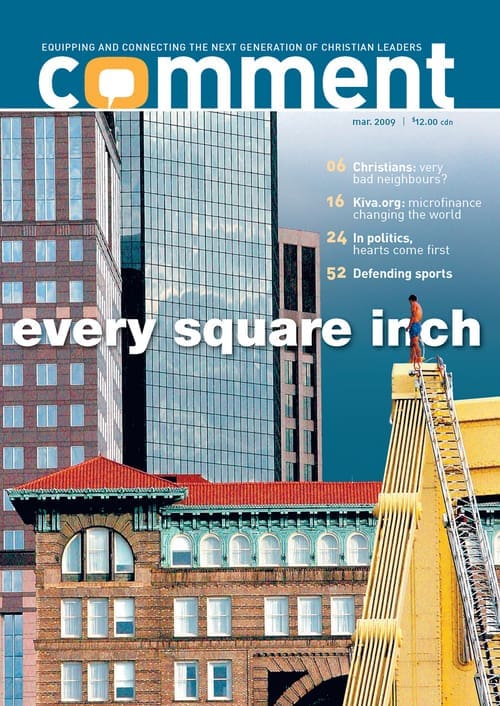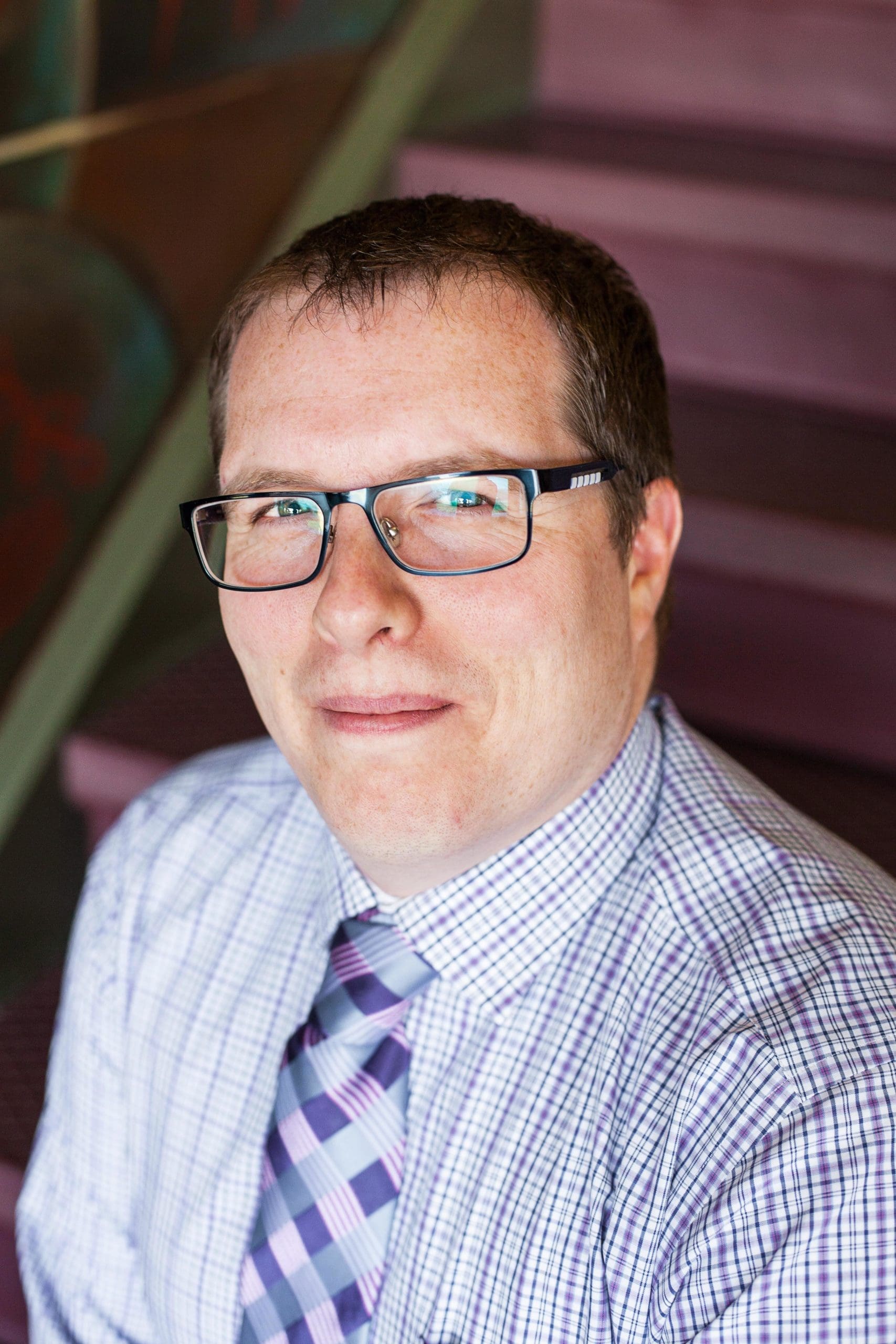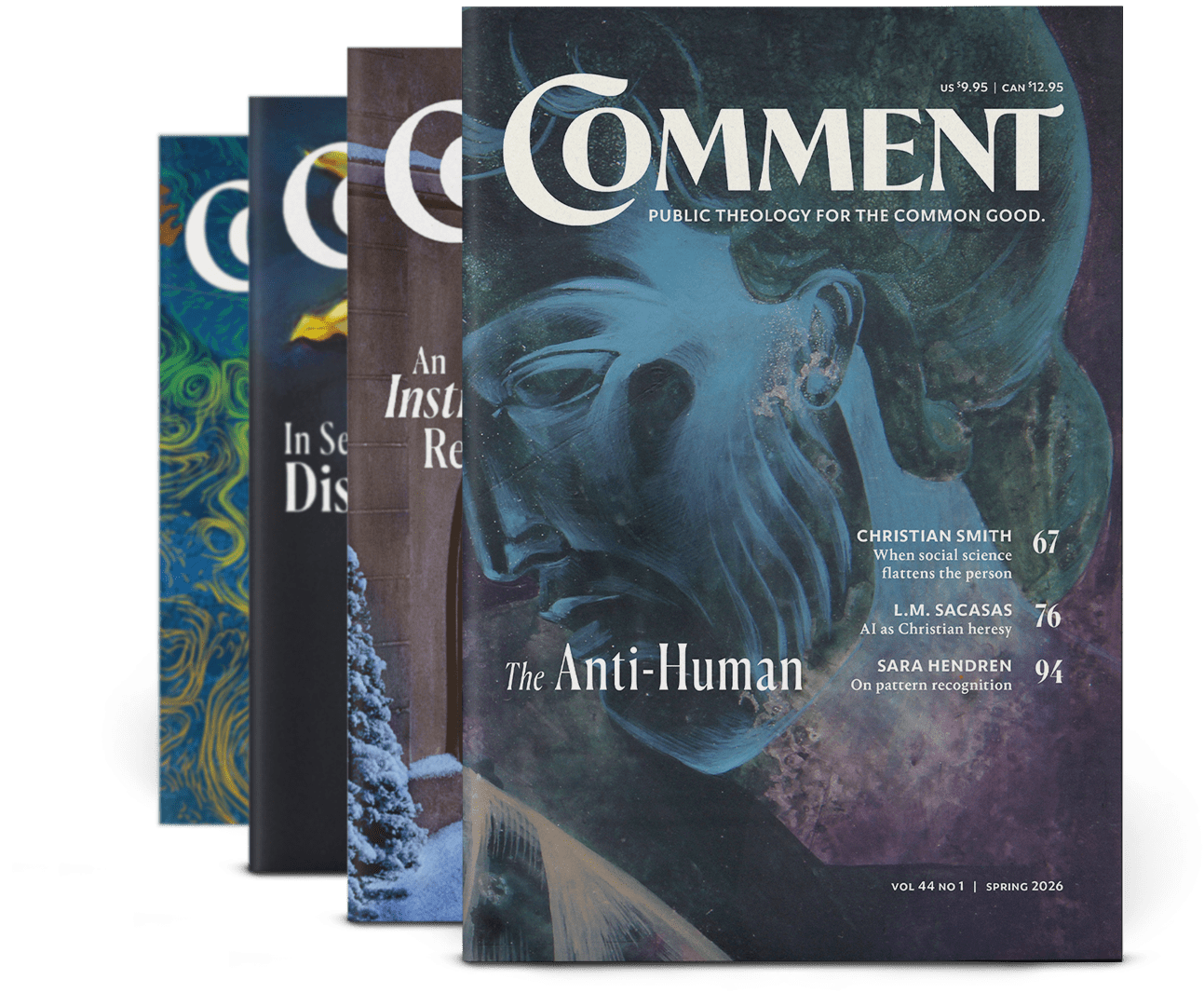“You take nice, good-natured, welcoming people and throw them into a town hall meeting somewhere, and they’ll tear each other’s eyes out.” The director of a downtown Salvation Army outlet was just warming up, telling me about some of the challenges of his day-to-day work. He had stories about Ivy League professors, lawyers, and even priests and pastors campaigning against the operations of the Salvation Army. The Army’s crime? They’d started operations in a nice part of town. There goes the neighbourhood!
The Salvation Army director taught me that professionals whose self-described vocations were to help those in need, to teach, to mentor and to promote law and justice fall victim to the NIMBY (“not in my backyard”) Syndrome, just like everyone else. We rarely like taking our own medicine, and these folks were no different. No level of governance is as open or intimate as municipal consultations. Do we design this park like this, or like that? Do we allow this re-zoning or that re-zoning, and how exactly do we deal with all those different colours of garage doors on Elm Street? Municipal consultations are the church hockey league of politics. You’ll never believe what your neighbours are capable of saying and doing in those settings.
Our cities are repositories of our deep passions because they are a microcosm of our shared life together. Cities don’t have the grand politics of war and peace, the high-rolling international trade treaties, or the silver-tongued, sharply dressed diplomats, but they embody stories about common life that big-time national and international politics don’t tell. I once had a pastor say to me, “Show me your bedroom, and I’ll show you who you are.” Similarly, I suggest, take me to your cities, your local places where you live out your everyday social reflexes, and I’ll show you who you are.
Over my years of running the Cardus Stained Glass Urbanism Project, I’ve come across a variety of perspectives and opinions on how people of faith—particularly Christians—can or should think about and interact with cities. I offer six common, internalized, and therefore often unspoken assumptions about religion and the modern metropolis. These are not philosophical blockbusters or high-level policy problems, but they do point to revealing social and cultural assumptions that are in dire need of fresh imagination.
Assumption #1: “Cities = Politics.”
Reply: Sort of—but it really depends on how you define “city.” At least two useful distinctions should be made between the City and the city, as defined by David Koyzis in a previous Comment. The City is a political community, a unit of local government, a municipality. According to Koyzis, “[the City] is a political subcommunity within the larger body politic.” The City has a variety of competencies and responsibilities which are significantly political. In this first sense, the City is about politics and the pursuit of justice. But as Jonathan Chaplin writes, a City or political municipality is “but one of many communities inhabiting the second sense of the term ‘city’.” Koyzis defines a city, with a lowercase “c”, as a “multifaceted network of local, differentiated communities—a community of communities.”
The difference here is critical. Too often we associate “cities” with the politics of “the City”, as though our municipal administrators retain comprehensive responsibility for the entire variety of activities that take place within its jurisdictional boundaries. Some City Councils seem to feel this is true—but it is not. The city as a network of differentiated communities contains a whole variety of authorities and institutions—often labelled under the nebulous term civil society—which contribute vitally to urban growth and revitalization. The City as a political body must occasionally adjudicate how these different communities can and should relate to each other, but it is not responsible for cultivating an exquisite arts community, or a flourishing non-profit sector. Governments can pass family-friendly tax laws, but they should not try and legislate how frequently people make love. It may pass laws and provide incentive to facilitate certain things, but politics—even municipal politics—cannot and should not be all things to all people.
Chaplin writes, “The notion of public justice . . . does not at all imply that governments have no jurisdiction at all in areas like business or education, as libertarians—and some of their misguided Christian apologists—absurdly propose. It implies, rather, that such jurisdiction must always be pursuant to, and so constrained and disciplined by, the clear and compelling imperatives of the public good.”
Assumption #2: “Cities are the new mission ground of North America.”
Reply: Yes, but cities are not simply a big conglomerate of the “unreached”. If our urban activities as people of faith are consistently predicated on conversion, we shall quickly become very bad neighbours. I think of this as a kind of spiritual narcissism which grows out of an interior insecurity about our own faith and life. Our exclusive goal becomes the conversion of the other—not out of love of our neighbour, but because our worldview cannot cope with any kind of fundamental diversity. The sheer existence of people of faiths other than our own destabilizes our uneasy belief in the comprehensive claims of our faith.
Cities are more than just political jurisdictions, and they are also more than just mission fields. The faithful Christian life is about more than conversion, as the Westminster Catechism usefully reminds us. The chief end of man is to “worship God, and to enjoy him forever,” and the chief end of human beings in the city is surely no different. City life for the thinking Christian is about more than proselytization. In fact, as missiologist Mike Goheen argues, the Great Commission is better translated: as you are going, make disciples of all nations. Sharing the Gospel story and its message of salvation with our neighbours is not the exclusive focus of human life in the city, but rather an internal reflex we live out in all the areas of life. As Thomas Farr points out in a recent book, World of Faith and Freedom: Why International Religious Liberty Is Vital to American National Security, Jesus gave the Great Commandment (“love one another as I have loved you”) before giving the Great Commission (“Go and make disciples of all nations”).
Thus we learn to live and share the Gospel story in ways that far exceed a simple dualistic mission—we start to think of worshipping God and honouring him by building efficient transit, planning public spaces for social networking, putting a splash of colour here and there, and facilitating public artwork to cultivate the playful and imaginative joy of the human spirit created imago Dei.
Sadly, we truncate the Gospel when we pursue conversion and proselytization as the exclusive goals of the Christian calling. Instead, the Gospel in the urban metropolis calls us forth into all the manifold spheres of city life, to enact justice, sustain and cultivate beauty and become “the glory of God; human beings fully alive”—to quote Irenaeus.
Assumption #3: “We must keep Church and State separate.”
Reply: Absolutely. Separation of church and state is an imperative founding principle of the American and Canadian political systems. In this context, separation of church and state means that the state doesn’t endorse or privilege one religion over another; it is, at least ostensibly, a neutral space in which different perspectives, religious and otherwise, contest, debate and decide on the appropriate dispensation of justice.
This does not mean that religion is inadmissible in public debate, and it certainly doesn’t mean religion should be marginalized. Thomas Farr goes so far as to argue that the Constitution of the United States, in explicitly protecting freedom of religion, is implicitly suggesting that religion itself is a public good—one for which the state should safeguard a place in a democratic society.
Following this logic, it is worth considering that the separation of church and state was never meant to indicate a chasm of dialogue or the cultivation of religious illiteracy, even though we often uncover both of these errors in municipal bureaucracies. Like business, religion is not within City governments’ competency to specifically endorse, but it is in the cities’—and therefore the City’s—best interest to provide the conditions within which business and religion, in general, may flourish.
According to Farr, the First Amendment to the American Constitution means more than religious tolerance—it means religious freedom. Tolerance, at best, means respecting views with which we disagree. This implies that we are putting up with something problematic, divisive and even potentially evil. By contrast, religious freedom can be understood as the embracing and defending of a human good, a political achievement by the democratic state that protects both religious and nonreligious citizens and promotes the common good. It permits religious communities to employ their religious beliefs in democratic debate on the same basis as other institutions in civil society. Such debate is an important first step toward what Scott Thomas, author of The Global Resurgence of Religion and the Transformation of International Relations, calls a rooted cosmopolitanism—an ethic which points to common virtues and practices within different traditions, rather than the alleged universalism of liberal or secularist values based on an Enlightenment rationality.
Assumption #4: “Working with government corrupts churches.”
Reply: Sure—and hanging out socially with non-Christians corrupts Christians. Avoiding non-Christians is not only theologically silly, but socially and politically destructive; this assumption is a corollary of the separation between church and state argument from the other side of the fence.
Throughout my research at Cardus, I have found that this fear in churches, like people, is linked to identity. Almost every church in a downtown area has struggled with it. Do we join a meals-on-wheels program? Do we open food banks or shelters? In the midst of pressing need, how do we prevent our church from losing its integrity and becoming just another non-governmental social service agency? Government programs are often the only financially sustainable way to cultivate a service agenda, but participation in them spirals into further identity conflicts about public service, confessional language, and proselytization. The price tag on government money for most orthodox Christian churches is just too high.
It doesn’t need to be. Working with governments—in any way—doesn’t have to corrupt churches, water down their mission, or turn their confessions insipid. Yes, government works with its own public, and at times secularist, agenda, one which may inhibit traditional proselytization. It seems to me, though, that communities can benefit from attending to a favourite axiom of a good friend of mine: that the journey in must always fund the journey out. One of the principle functions of a church community is to facilitate this journey in, a robust and active encounter with the Word of God, which forms the identity and mission of the church community. Surely a community consistently nurtured and rooted in a historical tradition of confession can retain a strong identity, in the midst of cooperation and conversation with those who believe differently, and perhaps—á la secularists—those we even perceive as being directly at odds with us?
The church is far more than a social service agency; nevertheless, the toxicity of government cheques or public moneys is exaggerated. When government money occasionally comes tied to expectations that overstep the legitimate authority of government, a church community with a strong, confessional identity should be able to wisely discern and decline; however, where the institutional church’s own sphere of activity genuinely overlaps and interrelates with the government’s, a rooted cosmopolitan engagement is essential.
Assumption #5: “Cities = $.”
Reply: Often true. In October 2008, I was in Calgary hearing from municipal politicians and activists whose most pressing question could be summarized as: “How can we ride the wave of global capitalism in ways that promote human scale flourishing?” Cities, just like the rest of society, tend to uncritically ride the money train. Corporations and developers, responding to supply and (occasionally artificially-stimulated) demand are the ones who effectively build the social and physical infrastructure of our cities. “More and more,” writes Jonathan Chaplin, “the modern city is moulded in the image of and at the behest of purely economic forces. Housing and infrastructural developments follow the homogenizing imperatives of corporate growth, instead of economic activities organized to serve human, social and environmental flourishing.” City government might facilitate this, but often they dare not get in the way; as our friend Thomas Friedman would remind us, if you want success and profit above all else you wear the golden straightjacket. Then you find that you live in a world where, as Margaret Thatcher used to say, “There is no alternative.”
There is always an alternative, but I admit it’s often not all that easy to see. It is an important first step to refrain from demonizing part of the urban economic process, recognizing that city politicians are not weak-kneed opportunists incapable of tough action, urban developers are not heartless capitalists eager to undermine human scale community and the average consumer is not a mindless cog in the capitalist machine, out to buy his or her way into an ultimately satisfying identity. These are unfair caricatures that reveal more about our cynicism and apathy than they do about the cultural climate.
Secondly, we must recognize that urban development is a city-wide problem, not merely a City government problem. If we are out to decisively win the battle for our cities in zoning meetings, town hall forums and council chambers, we’ve already lost. Politics is downstream of culture, and the culture is saturated with global capitalism.
Thirdly, global capitalism itself is not what’s wrong. Markets, the buying and selling of goods, and even supply and demand are good things that need to be defended in what has become an orgy of anti-capitalist propaganda. What we need are imaginative solutions to put proper boundaries on the market. The question is not “Markets: yes or no?” but rather, “How do we again orient markets to be at the service of human beings, to promote social and cultural flourishing in our cities?” In many ways, developers are caught in this question in the same way as the consumer or the City politician. One of the most exciting projects Cardus is involved in is bringing together roundtables of developers and municipal administrators to creatively probe this question. The answers are far from obvious, and there is a great deal of tough work to be done.
Assumption #6: “We need Action!”
Reply: Ok, but we have been taking action, and it’s been a spectacular failure. Evangelical Christians have mustered enormous political and social activism in the last decade, and seen incredible success in putting “their people” into the centre of power. Michael Lindsay in Faith in the Halls of Power argues that evangelicals have been punching way above their weight in political circles. But John Seel, responding to Lindsay’s book, argues that the glut of evangelical political activism hasn’t achieved the sort of results we wanted. A sudden influx of evangelical people and money into the realm of politics hasn’t solved a great deal, because it’s not just about getting people into power or onto the streets to make change happen—it’s about the quality of those people, that change, and the means used. “Our people” are in position, but they’re not who they need to be, where they are. Evangelicals agree we need people in power, but outside of hot-button social agendas, we’re not exactly sure why, or what being an evangelical has to do with, say, zoning by-laws or regional trade corridors.
I attended a Canadian university in the dead of winter. One fateful day, with snow drifts besieging doorways and loved ones and possessions lost in the wintry desolation, some friends of mine set out for “action.” Love of neighbour compelled them to take to the roads to assist beleaguered travellers. And so, with hearts full of good will, hands full of shovels, trunks packed with sand, cars equipped with balding summer tires, and discretion and common sense gusting away in gale force winds, they set out. I donned a bathrobe and settled in with hot chocolate and a trusted fantasy novel.
Suffice it to say they received far more help than they delivered, as—predictably—they themselves ran stuck time after time. The experiment in neighbour love was a complete train wreck. In Cardus’ Toronto the Good project I later learned that this kind of unprepared, ill-considered activism is endemic to Christian urban engagement. In the city of Toronto, faith groups—often those from outside the greater Toronto area—frequently undermine the efforts of city governments and experienced NGOs to alleviate street poverty and homelessness. Parachuting Bible-tract-armed adolescents with blankets, food stuffs and toiletries into an urban core creates far more problems than it solves. The words that city managers and municipal administrators had for this kind of irresponsible and disconnected activism were not kind.
Thomas Farr tells a similar story in World of Faith and Freedom, recalling how Bob Seiple—the former US Ambassador at Large for Religious Freedom—made searing criticisms of ill-informed and culturally clueless American missionaries. In an interview with Christianity Today, Seiple said that Western missionaries who descended on Russia after the fall of the Soviet Union were like “the great Oklahoma land rush; everybody threw their Bibles into the back of their Conestoga wagons and came running.” In his mind it constituted “an assault on Russia,” and as a result, the Orthodox Church partnered with the Russian government to pass laws restricting religious freedom—laws that would take years to undo.
Mothers were right after all: think before you act—and, to extend the logic of working in an urban environment—play well with others.
Lessons from Hot Fuzz
In the 2007 blockbuster movie Hot Fuzz, Sergeant Nicholas Angel is assigned to the idyllic country village of Sandford, consistent winner of the “Village of the Year” contest. He soon pieces together that, years ago, on the eve of the contest adjudicator’s arrival, sleepy Sandford was suddenly overrun by “dog muck, thieving kids and crusty jugglers.” The loss of the contest devastated the Chief Inspector’s wife, Irene, who lost her mind and drove her Datsun Cherry into Sandford Gorge. “From that moment on, I swore I would do her proud,” promised the Chief Inspector. The Inspector, along with other influential townspeople, form the Neighbourhood Watch Alliance, a crypto-fascist wing of the town’s award committee, to ensure that Sandford will never lose the award again.
The people of Sandford lost faith in the institutions and people in their town to work together and create a better village. Even the town’s priest—who appropriately screams “Jesus Christ!” after being shot in the arm—lost faith. The Neighbourhood Watch Alliance was ultimately pessimistic that Sandford—without their (violent) intervention and (draconian) guidance—could succeed.
For people who are supposed to have “reason at all times for the hope we have,” Christians tend to be curiously pessimistic about our villages and cities. We wash our hands of our markets and decry the consumerism of our neighbours. We complain that our City councils won’t hear religious perspectives, but privately avoid people who do not believe as we do. We may even completely excuse ourselves of a responsibility to the common good of our cities, consigning them to burn in the fires of avarice, and hoping only to save a few worthy souls who may join us in eternal enlightenment.
Our goals, when they are worthy, tend to overemphasize ends and underemphasize means. Like the Neighbourhood Watch Alliance of Sandford, we’re guilty of violently pursuing our cultural and political ends, believing in an ultimate vindication through the righteousness of the cause. But our means matter. They may even be decisively important. The observations I’ve made about our assumptions suggest that our common sense isn’t always right, and we—as church and as society—need space and time to rethink, research and rebuild better and more sophisticated and imaginative alternatives. Then our social, civil and municipal victories won’t be over the bodies of our neighbours, but will be hard-won success amongst religious and non-religious alike.



